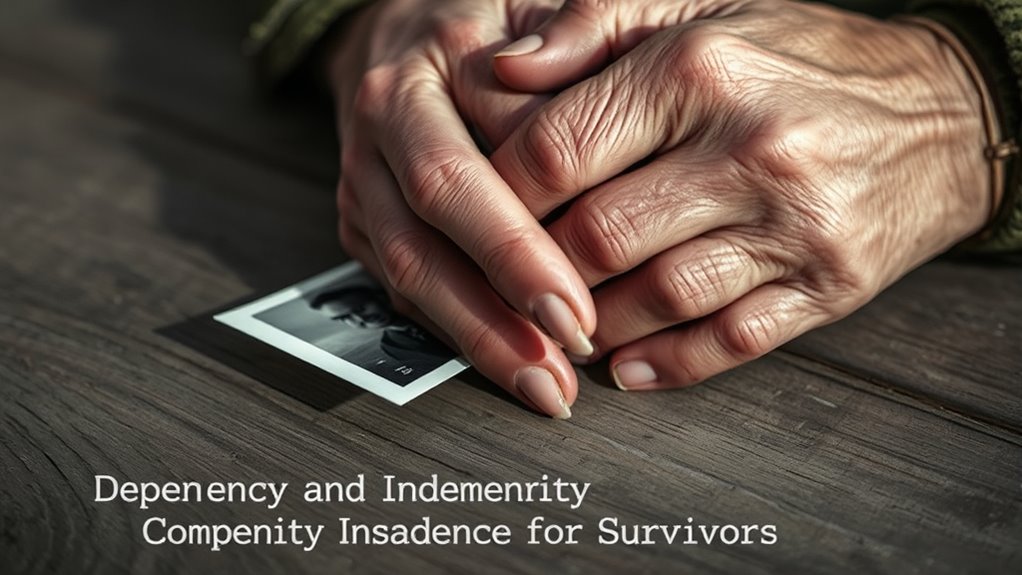If you’re a survivor seeking Dependency and Indemnity Compensation (DIC), you need to meet certain eligibility criteria based on the veteran’s service connection and cause of death. You should gather essential documents like marriage certificates, service records, and the death certificate to support your claim. Applying is straightforward through the VA, but ensuring your paperwork is complete and accurate is key to avoiding delays. Continue exploring to learn how to navigate challenges and access helpful resources.
Key Takeaways
- DIC provides monthly financial support to eligible survivors of deceased veterans with service-connected disabilities.
- Eligibility requires proof of veteran’s service connection, relationship, and cause of death, supported by official documents.
- Application can be submitted online, by mail, or in person, with accurate forms and supporting evidence.
- Benefits may include monetary payments, healthcare access, and survivor support programs.
- Proper documentation and organization are essential to avoid delays and ensure successful claim approval.
Understanding Eligibility for DIC Benefits

To qualify for Dependency and Indemnity Compensation (DIC) benefits, you must meet specific eligibility criteria set by the Department of Veterans Affairs. Survivor eligibility depends on several factors, including the veteran’s service connection and the cause of death. The benefits calculation considers your relationship to the deceased and their service history. If you’re the surviving spouse or child, you generally qualify if the veteran’s death was related to their service or a service-connected disability. In some cases, other family members may also be eligible. The VA reviews your relationship and the veteran’s medical records to determine your eligibility. Understanding these requirements helps clarify whether you’re entitled to DIC benefits and how the benefits calculation is made based on your survivor status. Additionally, Gold IRA investing options in your state could be a strategic way to secure your financial future after experiencing such loss.
How to Apply for Dependency and Indemnity Compensation

To apply for Dependency and Indemnity Compensation, you’ll need to gather specific documents, such as proof of the deceased veteran’s service and your relationship. Once you have everything, you can submit your application through the VA’s online portal, in person, or by mail. Understanding the application process helps guarantee your claim is complete and processed smoothly. Additionally, being aware of the application requirements can help you prepare your submission more effectively.
Required Documentation Checklist
When applying for Dependency and Indemnity Compensation (DIC), gathering the right documents is essential to guarantee your claim moves smoothly through the process. You’ll need proof of your relationship to the deceased, such as marriage certificates or birth certificates, to establish survivor support. Military benefits documentation, like service records or death certificates, confirm the veteran’s status and cause of death. Financial records, including tax returns or Social Security benefits, help verify income and dependency status. Additionally, submit anything that shows ongoing support or care, such as wills or power of attorney documents. Ensuring you have all relevant paperwork ready will streamline the process and improve your chances of a successful claim. Proper documentation is key to securing the survivor support you deserve. For example, understanding the Grobal World can provide context for certain international or military-related documentation requirements.
Application Submission Process
Applying for Dependency and Indemnity Compensation involves a straightforward process that you can complete either online, by mail, or in person. First, review the benefits overview to understand the specific eligibility criteria and types of benefits available. The claim process begins with gathering necessary documentation, including proof of the deceased’s service and your relationship. You’ll need to fill out the VA’s application forms accurately and submit them along with supporting evidence. You can start your application online through the VA’s website, mail completed forms to the regional office, or schedule an in-person appointment. Once submitted, the VA reviews your claim, evaluates your documentation, and determines your eligibility. Staying organized and responsive during this process helps guarantee a smooth and timely decision. Knowing how to properly prepare your divorce documents can help streamline your application process.
Types of Support Provided Through DIC

Dependency and Indemnity Compensation (DIC) offers essential financial support to surviving spouses, children, and dependent parents of deceased veterans. This form of survivor support helps guarantee the financial burden caused by the loss of a loved one who served in the military. DIC provides various types of assistance, including:
- Monthly monetary payments to eligible survivors
- Compensation for dependent children and spouses
- Benefits that can include additional allowances for special circumstances
- Access to certain healthcare benefits and survivor support programs
- Understanding divorce statistics can help inform survivors about the importance of proper legal and financial planning after a veteran’s passing.
These benefits ensure survivors can maintain financial stability and access necessary resources. By offering these types of support, DIC aims to honor the service of veterans while providing peace of mind for their loved ones.
Important Documentation and Evidence Requirements

To guarantee your claim is successful, you need to provide the proper proof documentation. Follow the evidence submission guidelines carefully to avoid delays or denial. Making sure your paperwork is complete and accurate is essential for a smooth process. Additionally, demonstrating emotional support throughout the process can help address any stress or concerns that arise.
Necessary Proof Documentation
Gathering the necessary proof documentation is essential to establish your eligibility for Dependency and Indemnity Compensation (DIC). You’ll need specific evidence to support your claim, including documents that verify your relationship and the service member’s status. Key items include:
- Marriage verification, such as a marriage certificate
- Veteran’s military service records showing qualifying service
- Death certificate of the service member
- Proof of dependency, like financial support or shared residence
Ensure these documents are official, legible, and up-to-date. Providing thorough and accurate evidence helps streamline the application process and reduces delays. Having the right documentation readily available increases your chances of a successful claim and secures the benefits you deserve.
Evidence Submission Guidelines
Submitting your proof documentation correctly is essential to guarantee your claim is processed smoothly. You need to provide clear marriage proof, such as a marriage certificate, to establish your relationship. Additionally, submitting original or certified copies of death certificates for the deceased is vital to verify their passing date and eligibility. Make certain all documents are legible and up-to-date. If your marriage isn’t registered, provide alternative evidence like affidavits or joint financial records. Double-check that all forms are completed accurately and include the proper documentation before submitting. Failing to include the necessary proof could delay your claim or result in denial. Proper documentation ensures your claim is processed efficiently, and following these guidelines carefully will help VA review your case smoothly and ensure your survivors receive the benefits they deserve.
Common Challenges and How to Overcome Them

Managing the process of claiming Dependency and Indemnity Compensation (DIC) can be challenging, especially when paperwork and eligibility criteria seem confusing or overwhelming. You might feel frustrated or emotionally drained, making it hard to stay resilient. Building emotional resilience is essential, and seeking grief counseling can provide vital support. To overcome these challenges, consider the following:
- Stay organized by keeping detailed records of all documents
- Break the process into manageable steps to avoid feeling overwhelmed
- Reach out for support from veterans’ service organizations
- Practice self-care and seek emotional resilience through counseling or peer groups
Resources and Assistance for Survivors

Are you aware of the various resources available to help survivors navigate the process of claiming Dependency and Indemnity Compensation (DIC)? Many organizations offer support, including grief counseling to help manage emotional pain and peer support groups where you can connect with others facing similar losses. These resources provide guidance on filling out claims, understanding eligibility, and coping with grief. Veterans Affairs offices and community-based organizations often have dedicated staff who can assist you step-by-step. Additionally, online forums and local support groups create safe spaces to share experiences and gain encouragement. Utilizing these resources can ease the process and help you find comfort during a difficult time, ensuring you’re not alone as you pursue your rightful benefits. Personalized in-home care services can also offer vital support during this challenging period, helping to maintain your loved one’s dignity and independence.
Frequently Asked Questions
Can DIC Benefits Be Transferred to Grandchildren or Other Relatives?
You might wonder if DIC benefits can be transferred to grandchildren or other relatives. Generally, beneficiary eligibility is limited to surviving spouses, children, or parents, and transfer limitations prevent direct transfer to extended family members. DIC benefits are designed to support eligible survivors, so they can’t be assigned or transferred to grandchildren or unrelated relatives. If you need assistance, contact the VA to explore specific circumstances or alternative support options.
Are DIC Payments Affected by the Survivor’S Own Income?
You might wonder if your own income impacts your DIC payments. Generally, DIC benefits aren’t affected by your income, since they’re designed to provide financial support regardless of your earnings. However, benefit calculations can vary if you’re receiving other income or benefits. It’s best to review specific circumstances with the VA or a benefits advisor to understand how your income impact might influence your DIC payments.
How Long Does the Approval Process Typically Take?
When you ask about the approval process, the application timeline can vary based on your situation. Typically, it takes several months, but processing delays may extend this period. To speed things up, verify all your documents are complete and correctly filled out. Keep in mind that factors like backlog and complexity of your case influence the overall timeframe. Stay patient and stay in touch with the VA for updates.
Can Surviving Spouses Remarry and Still Receive DIC?
They say, “Love knows no bounds,” but when it comes to DIC benefits, your marital status matters. If you remarry before age 57, you usually lose your benefit. However, if you remarry after 57, you can still receive DIC, ensuring benefit continuity. Always check current VA rules, as regulations may change, but your eligibility often depends on your specific situation and timing of your remarriage.
What Are Common Reasons for Claim Denials and Appeals?
When you file a claim, common reasons for denials include missing or incomplete claim documentation and application errors. You might also face denial if your paperwork doesn’t meet specific eligibility criteria or if there’s inconsistent information. To improve your chances, double-check all documents, verify accuracy, and follow the application instructions carefully. If denied, you can appeal by providing additional evidence or correcting errors to strengthen your case.
Conclusion
Understanding your eligibility, gathering the right evidence, and seeking support can make managing Dependency and Indemnity Compensation smoother. By staying informed, preparing thoroughly, and reaching out for assistance, you empower yourself to overcome challenges and secure the benefits you deserve. Remember, you’re not alone in this journey—focus on clarity, persistence, and support to honor your loved one’s sacrifice and find the stability you need for the future.











